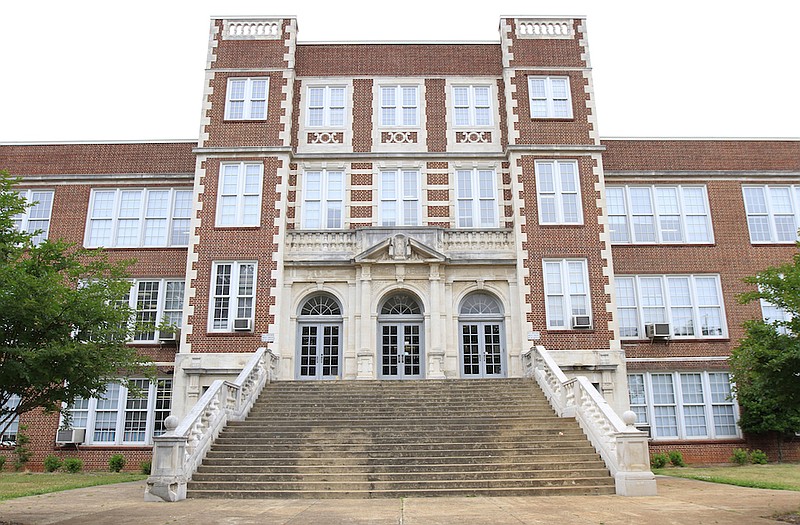Larry Baker was anything but an average basketball player at Riverside High School in the spring of 1969.
A powerful rebounder, inside threat and defensive demon for the late, great Dorsey Sims, Baker, by his own words, "Basically could have gone anywhere in the United States."
But as his recruiting heated up following another Tennessee state championship by the Trojans, he decided to pray over his plight one night. The next day evangelist Oral Roberts and his university's basketball coach Ken Trickey showed up at the family's Chattanooga home.
"President Roberts looks at me and says, 'God wants you to come to ORU,'" recalled Baker. "So I turn to my mom and said, 'I'm going to ORU.'"
That's just one of many stories told in the wonderful documentary "Praise the Lord and Pass Me The Ball" about the meteoric rise of the ORU basketball program in the early 1970s, thanks in large part to a handful of former Riverside players who became stars with the Titans. It can be viewed at ORU.com, Netflix and other sites.
A labor of love by the late Trickey's children Ken Jr. and Kay Trickey Herring and Nashville-based film maker John Buchanan, it had a debut of sorts this past Saturday in the auditorium of Chattanooga Arts and Sciences, which was once Riverside High.
"Riverside was very important to the success of ORU basketball," said Trickey Jr., formerly the head coach at Clemson. "I was 11 years old when my father would bring me here to play with Dorsey Jr. while my dad and his dad discussed the Riverside players. Coach Sims knew my dad would take care of his players, and he had the best players in the state of Tennessee."
Trickey also knew he was more likely to get them all if he recruited them as a group, hoping friend and teammate would encourage friend and teammate to all choose the same school.
"If you had two or three friends who he thought could help the program, you all got scholarships," said Terry Scott, the Bradley Central great who played for Trickey at Middle Tennessee State, then followed him to ORU as an assistant.
So that loaded Riverside squad wound up sending the scoring machine that was Richard Fuqua, Jesse Traylor, Eddie Woods and Baker. The insanely gifted Anthony "Woozie" Roberts would join them a few years later. Cleveland High product Greg Davis - who later played minor league baseball for the Baltimore Orioles and was recruited for football at Alabama - also signed with the Titans.
Said Davis with a smile on Saturday, "Coach Trickey could talk you into anything."
There may never be anything again in college basketball to duplicate what happened at ORU between Trickey's arrival in 1969 and his departure following the 1974 season. Having started the ORU program but a couple of years before Trickey came aboard, the Titans reached the NIT in 1972 - knocking off a Memphis State squad that would lose to UCLA a year later in the 1973 NCAA title game - then came within an overtime loss to Kansas in the 1974 Midwest Regional final to reaching the Final Four.
What understandably drove his children to develop the documentary was a 2018 article on the eve of that spring's March Madness that chose the top 25 "Cinderella stories" of the NCAA Tournament's 80-year history, but never mentioned Oral Roberts University's stunning run.
"We tried reaching out to ESPN to do a '30-for-30' or something, but no luck," said Ken Jr. "Tried other avenues - no luck."
In the end, they probably couldn't have chosen a better person than Buchanan, who not only masterfully tells the story, but does so with music and video that gives a distinct early 1970s feel to the piece. Think the TV cop shows "Streets of San Francisco or "Mod Squad" and you've got some sense of the documentary's style.
If there was an overwhelming star to it all, it was Fuqua, who averaged over 27 points a game for his career, scored 35.9 his junior year and scored 50 or more points on four occasions. He finished his ORU career with 3,004 points without the benefit of a three-point shot.
The school having coined the acronym WRAG (We run and gun), Baker said of Fuqua's game, "We did the running, he did the gunning."
But it was Trickey who got them to the Tulsa campus and Trickey who created the racehorse style that confounded so many.
Said his wife at that time, Peggye, of the hectic pace that twice led the nation in scoring: "I don't think I'd breathe the whole game."
As much fun as that style was, what his players most remember is the opportunities he afforded Black athletes at a time when many major universities were still reluctant to field an all-Black starting five.
"He could identify with Black athletes," said Baker, who never left Tulsa after graduation. "He coached us when we were called colored people, when we were called Negroes, when we were called Black and when we were called African-Americans. He made us a part of his family."
Nearly 48 years later, and nine years after Trickey's death in 2012, all those Riverside guys, Scott and Davis still feel a part of the Trickey family.
"We're still living today," said Scott, "through what Coach Trickey did for us."
And what a talented bunch of Chattanooga area hoopsters did for him.
Contact Mark Wiedmer at mwiedmer@timesfreepress.com.
